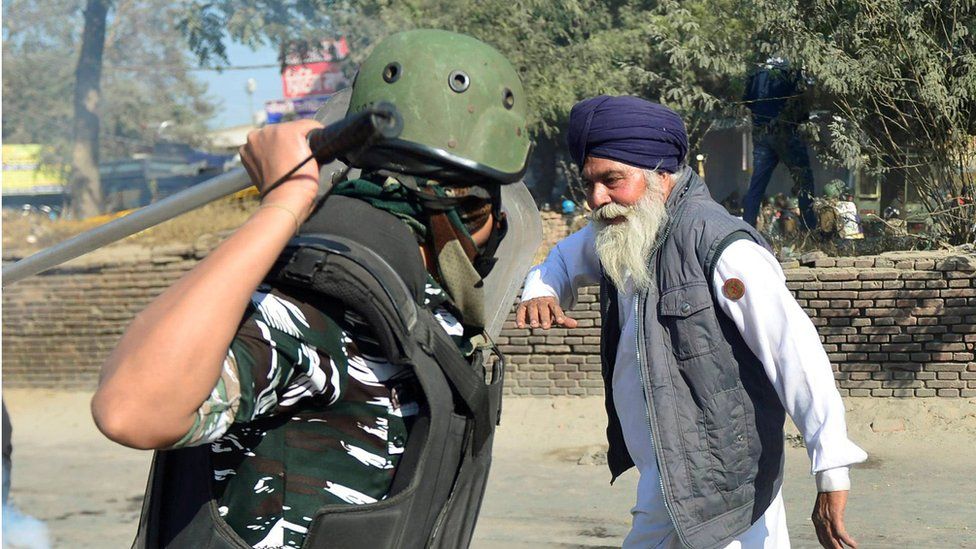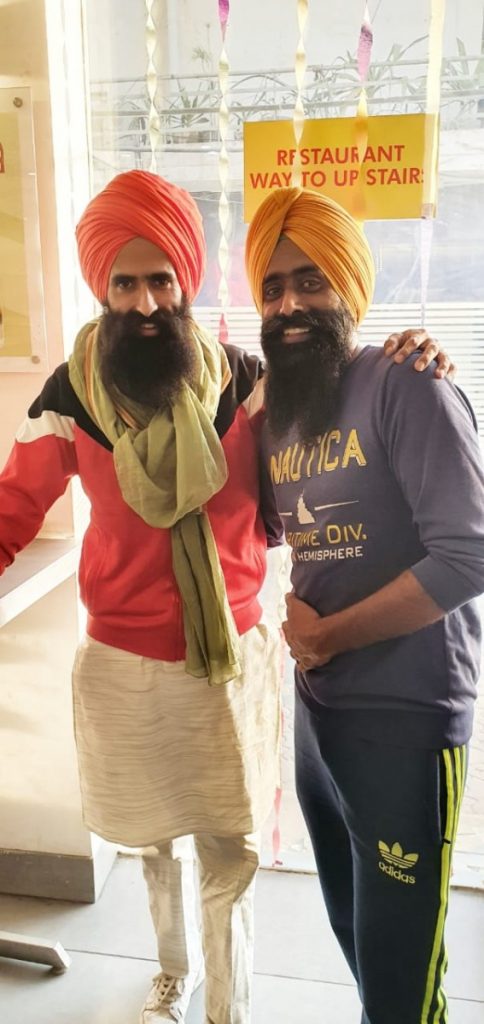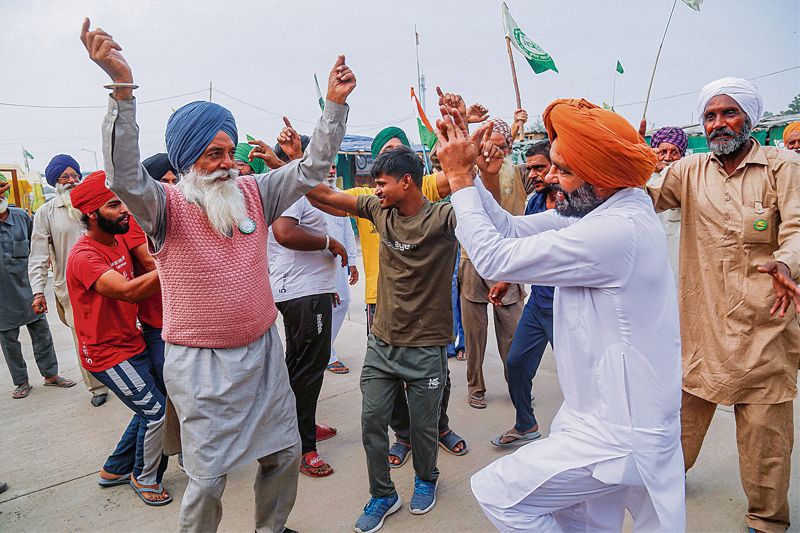Jalandhar: “Saadi sameen saadi Maa hai, asi apni Maa nai chad sakde. Je morcha fateh na hunda, asi Pind mud ke nai auna si. Hun asi jit ke ja rahe haan (Our land is our mother; we cannot leave our mother. Had we not succeeded in this protest, we would have not gone back to our villages. Now we are heading home after our success),” Sukhdev Singh (62), a farmer from Sangojla village in Punjab’s Kapurthala district said with joy and a choked voice.
A year ago, when farmers left for the ‘Delhi Chalo’ march, Sukhdev also joined the protest against the three farm laws and became one of the faces of farmers’ protest.
His iconic photo – of being beaten up by the Haryana Police on his way to Delhi – went viral on social media and made national headlines, triggering massive support from people worldwide. The photo was not only used by the farmers’ groups but also by the BJP IT Cell to propagate a fake narrative about the farmers’ protest.

On Friday, when farmers were all set to go back home after one year and 13 days at Singhu border, Sukhdev said, “Rehndi duniya tak saade morche baare gal hoyegi (People will talk about our farmers’ protest till eternity). The year-long protest has renewed my identity as a farmer. Consecutive governments have ignored us but this agitation has brought us into the mainstream.”
Sukhdev also said that since his photo went viral on social media, he was flooded with calls and videos from across the world. “It was November 26, 2020. While removing the barricades, Haryana Police had hit me with batons on my shoulder, knees and thighs but instead of running away, I stayed there with deep bruises and injuries. Noticing the police brutality, youth got provoked and they shielded me. I still get goosebumps whenever people ask me about that day. But I am a happy farmer today because we fought hard to save our lands and earned a victory,” he added.
Sukhdev initially stayed at Singhu border for four consecutive months, but later came home and kept going back frequently. There were others like Jasbir Kaur Natt, though, who stayed at Tikri border throughout the protest and managed the stage deftly.
A member of the Tikri Border Action Committee, Jasbir said that there are terms like ‘samajwaad (socialism)’ and ‘punjiwaad (capitalism)’, which are used in the context of protests. “Earlier, women confined to the four walls of the house had never even heard about these terms. Today, they can lead an hour-long session on these subjects and that too from the stage. I noticed how women gained confidence through the movement and voluntarily started talking about not just farmers’ protest but other key issues too. Now, women know that they can achieve anything with unity, even force the governments to change their anti-people laws,” she said.
But Jasbir lamented that women are not even considered as farmers, even though they have a major contribution to the farming sector.
“Even the agricultural land is not transferred in the name of women. We held discussions on these subjects at Tikri border and even observed January 18 as ‘Women Farmers’ Day’. Till date, farmers’ organisations in Punjab had no women leaders in organisational posts but now their number will increase,” she said, adding on a lighter note that the farmers’ protest is an ideal example of gender equality too, as now men have also learnt how to cook chappatis and clean utensils within a short span of time.
At Singhu and Tikri borders, apart from other key takeaways from the farmers’ protest, people also take pride in mentioning Punjab and Haryana’s bonhomie.
From initially supporting farmers from Punjab to providing dry ration, vegetables and logistics, Haryana played a pivotal role in strengthening the ties.
As Navdeep Singh, the young boy who became the ‘hero’ of farmers’ protest from Jalbera village of Ambala district in Haryana, said, “Till date we used to read adages like ‘unity is strength’ but now we know what it really means. After India’s freedom struggle, farmer’s protest is the only movement in the history of independent India, in which youth participated voluntarily from day one and remained a mobilising force.”
Navdeep also pointed out how langar sewa united people. “At protest sites, people from all religions used to stay together and eat together. Ek thaali mai roti khayi hai humne (We have eaten together in one plate). Farmers’ protest served as the antidote of the government’s communal and divisive agendas,” he added.
During the year-long movement, Navdeep was slapped with 14 FIRs on different grounds by Haryana police. One of the FIR was lodged for attempt to murder, rioting and violation of COVID-19 rules after he jumped atop a police van and turned off the water canon vehicle when farmers were heading to Delhi on November 25.
Navdeep’s videos and photos are still seen on social media. “I was enthused by the farmers’ protest and performed the daring act of jumping on the water canon vehicle and turning off its tap. At that time, all I wanted to do was to save our farmers from getting drenched in the harsh cold. Farmers’ movement has given us a new ray of hope in the country,” he continued.
Another young farmer and activist, Tejvir Singh (34) from Panjokhra Sahib village in Ambala, was among the first few groups who lifted barricades on November 25. He said, “Now we know how to raise our voice for our rights. I think after a long time, it is now that the youth has finally got direction in life. We have become united, organised and learnt about our potential too, which was not the case earlier.”
On the volunteer service performed by people, Tejvir said whether it was langar sewa, supplying milk, vegetables, making slogans or spreading the word about the farmers’ protest through social media, people just kept joining the protest.

“It feels as if there was a divine blessing on this movement. Liaising was the key for us and we reached out to farmers and youth in Maharashtra, Gujarat, Uttar Pradesh, West Bengal and other states during the year-long movement for state-level dharnas. The impact of farmers’ protest will go on for generations,” he added.
While the farmers’ protest gave direction to the youth, it was the joy of seeing farmers’ getting international recognition that counted the most for Jasmail Kaur from Deon village, Bathinda district.
Before she could list any of her experiences, the elderly woman said, “It feels great to see how farmers overcame all obstacles, created history and became a subject of debate worldwide. I feel proud of my farming background. A person like me, who never ventured out of Bathinda alone, went to Tikri border in Delhi with fellow women protestors. Farmers’ movement has boosted our morale to a point that at times, I feel short of words to explain how I feel about it. It is in our genes to fight and stand against injustice, come what may. And women not just helped in cooking a 24×7 langar at Tikri border but also emerged as equal participants of the movement. We were confident from day one that farm laws will be repealed and we are coming home with flying colours,” she said.
Jasmail also talked about how faith in god kept them going in some of their toughest moments.
Sharing one such incident, she said, “During peak monsoons, it was raining heavily and there was no dry place at all to even sit and cook langar. The tarpaulin was leaking while all tents were choked with water. Suddenly, we noticed that a part of the tarpaulin stopped leaking and with prayers on our lips we started cooking chappatis hurriedly. It was Guru Nanak Dev’s blessings that despite bad weather, we could find a small dry place to cook food and serve the farmers. It was moments like these which kept us in high spirits.”
As Sukhdev also added, “Asi Guru Gobind Singh di fauj haan, kade peecha nai mud de. Morcha fateh karke hi mude haan (We are the followers of Guru Gobind Singh, once we take a decision, we never look back. We came back only after a successful farmers’ protest).”
The story is written by Kusum Arora and was first published by The Wire.













